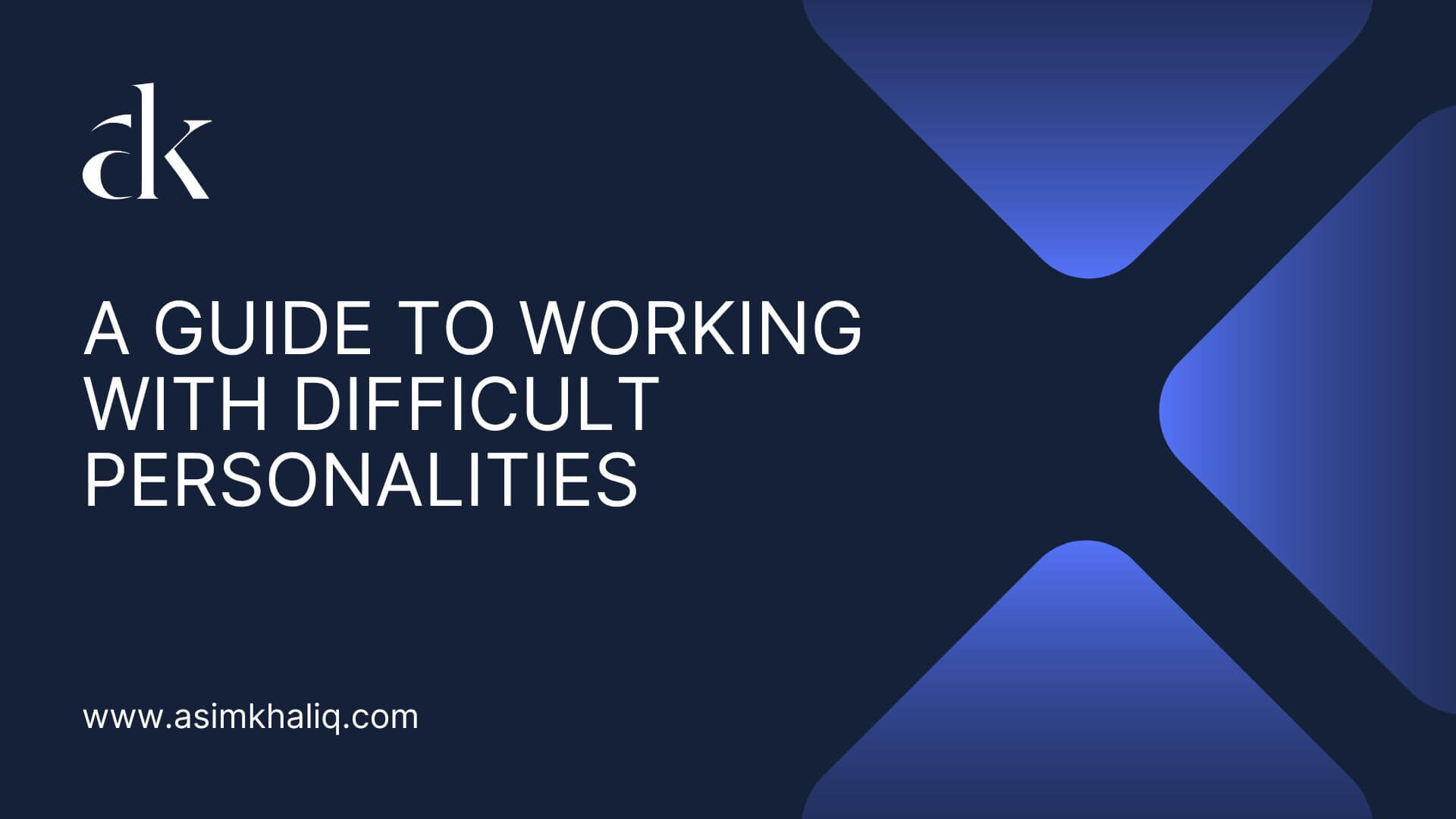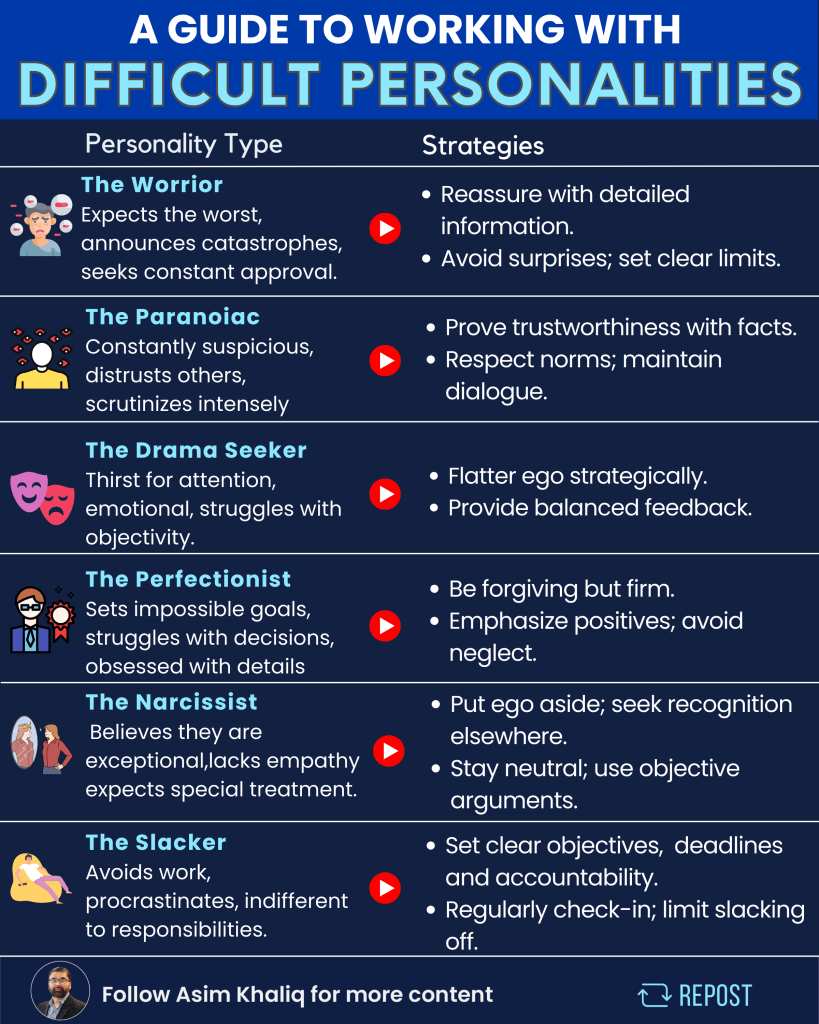
A Guide to Working With Difficult Personalities
In any workplace, you’re bound to encounter various personality types – some more challenging than others. Difficult personalities can derail productivity and harmony, whether it’s the chronic Worrier, the micromanager, or the office drama queen.
Understanding these personalities and having strategies to work with them effectively can mean the difference between a stressful, conflict-ridden environment and a positive, collaborative one. Let’s look at six common difficult personalities you may face and how to navigate them skillfully.
Understanding Different Personality Types
The Worrier
This person expects the worst, constantly announces impending catastrophes, and seeks endless reassurance. The Worrier’s anxiety is distracting and can stall progress if not addressed.
Strategies:
• Provide detailed information to ease their mind
• Avoid surprising them – outline expectations clearly
• Set boundaries on the approval/reassurance you give

The Paranoid Coworker
Chronically suspicious, the paranoid person distrusts others’ intentions and scrutinizes every move. Their unfounded concerns can strain team dynamics.
Strategies:
• Prove your trustworthiness with clear facts/data
• Respect workplace norms and maintain open dialogue
• Give no reason for distrust with your actions
The Drama Seeker
This person has an endless thirst for attention and emotional chaos. They struggle with objectivity and often make mountains out of molehills, distracting everyone in their wake.
Strategies:
• Strategically (but briefly) flatter their ego
• Provide balanced, impartial feedback
• Avoid emotional escalations at all costs
The Perfectionist
The perfectionist sets impossibly high standards, struggles with even minor decisions, and obsesses over minute details—their inability to prioritize and delegate stymies progress.
Strategies:
• Be patient but firm in keeping things moving
• Emphasize what is going well
• Don’t neglect their efforts or dismiss their concerns
You might Like these blogs
The Narcissist
With an overinflated ego and sense of importance, the narcissist demands special treatment and lacks empathy for others. Their self-absorption disrupts teamwork.
Strategies:
• Put your ego aside in dealings with them
• Use objective data/metrics rather than subjective arguments
• Find recognition elsewhere if they won’t provide it
The Slacker
This person chronically avoids work, procrastinates on deliverables, and is largely indifferent to their responsibilities. Their lack of motivation drags the entire team down.
Strategies:
• Set clear objectives, deadlines, and accountability measures
• Check in regularly to keep them on track
• Don’t enable excuses – limit their ability to slack
Strategies for Effective Communication
Addressing Worriers
- Reassure Worriers with detailed information and evidence to alleviate their fears.
- Avoid surprises and set clear limits to provide them with security and stability.
Dealing with Paranoiacs
- Prove trustworthiness to Paranoiacs by consistently providing factual information and demonstrating reliability.
- Respect established norms and maintain open dialogue to build trust and alleviate suspicions.
Handling Drama Seekers
- Flatter Drama Seekers strategically manage their need for attention but also provide balanced feedback to encourage more objective perspectives.
- Emphasize positive aspects of their contributions while gently steering them away from overly dramatic behavior.
Managing Perfectionists
- Be forgiving yet firm when dealing with Perfectionists, understand their struggle with decision-making, and set clear objectives and deadlines.
- Provide constructive feedback and recognition for their achievements to maintain motivation.
Interacting with Narcissists
- Put ego aside when dealing with Narcissists and seek recognition for their accomplishments from external sources.
- Stay neutral and use objective arguments to address their behavior, avoiding engaging in their self-centered narratives.
Supervising Slackers
- Set clear objectives, deadlines, and accountability measures to keep Slackers on track.
- Regularly check in with them and limit opportunities for slacking off to ensure productivity and responsibility.
Working with difficult personalities is no easy feat, but employing the right strategies can help neutralize their negative impacts. With self-awareness, emotional intelligence, and an understanding of what motivates each personality, you can navigate office conflicts productively.
The key is to avoid taking their behavior personally and customize your approach based on their specific tendencies. Use objective facts, clear communication, and emotional restraint. With practice and persistence, you can diffuse difficult situations, inspire more positive conduct, and bring out the best in all personality types.
FAQs.
A: Self-awareness is critical. Identify your tendencies through feedback, reflect on their impacts, and actively work on moderating unhelpful behaviors. Consider working with a coach.
A: As a last resort, you may need to loop in a manager or HR for an impartial intervention. But be sure to document all efforts made before escalating.
A: Develop emotional detachment by recognizing their issues are likely not about you. Practice self-care, lean on supportive colleagues, and don’t take the bait of negativity.
A: Patience. Lasting change rarely happens overnight. By consistently modeling professional behavior, you incrementally increase chances for more positive conduct.




